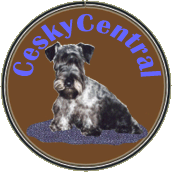
Nutrition can
be a controversial subject and there are many diets available, from commercial
food to completely natural diets.
The
following provides some general guidelines, but you should always work
closely with your veterinarian to determine the best diet for your dog
and keep up to date on the latest information.
Research your choices thoroughly yourself as well. There is much
information available in books and on the Web on this subject.
If you get a young Cesky puppy (8-12 weeks old), he or she will probably
need three or four meals a day.
If you decide on a commercial diet, be sure to feed a good quality dry
puppy food. Although supermarket brands may seem cheaper, if you
compare the serving sizes for proper nutrition, you will find that the
better quality foods purchased from a pet food supply store are actually
less expensive and contain much less waste and fillers. There
are a number of choices in terms of ingredients, protein sources and preservatives
(artificial or natural).
It is a good idea to supplement young Cesky puppies with calcium, particularly
while they are teething. Plain yogurt (unsweetened) works well, or
you can speak with your vet about a supplement. During teething,
calcium needs increase and you may notice that your Cesky develops "flying"
ears (ears that stick out rather than lying in the correct position).
Some extra calcium can help prevent this.
Puppies and dogs do best on a steady diet. When
you get your new puppy, be sure the breeder gives you feeding
instructions. Find out before you bring him home, what your puppy is used
to eating, how often and what his or her schedule is, and make sure you have a
supply of the food he has been eating. Even if you plan to change
brands, be sure to feed your puppy what he is used to eating at first, and try
to keep him on the schedule he is accustomed to following. If you do need to change
foods, do it gradually by mixing increasing portions of the new food in
with the old. This will avoid stomach upsets. Also adjust his schedule
gradually to suit your own.
Avoid excessive
use of table scraps. These are fine occasionally as a treat, but
don’t provide balanced nutrition and should not be a major staple in your
dogs diet.
You should discuss proper feeding with your
vet, and follow his or her advise on how much to feed, how often, when
to cut back on feedings and what, if any, supplements to give.
Most adult Cesky Terriers are fed once or twice a day, and eat ¾
-1 ½ cups of food, depending on their level of activity.
Because they often love to eat, they can become overweight if you are not
careful with feeding and treats.

